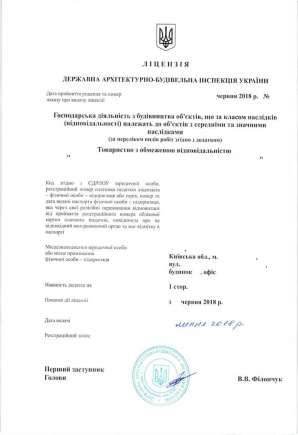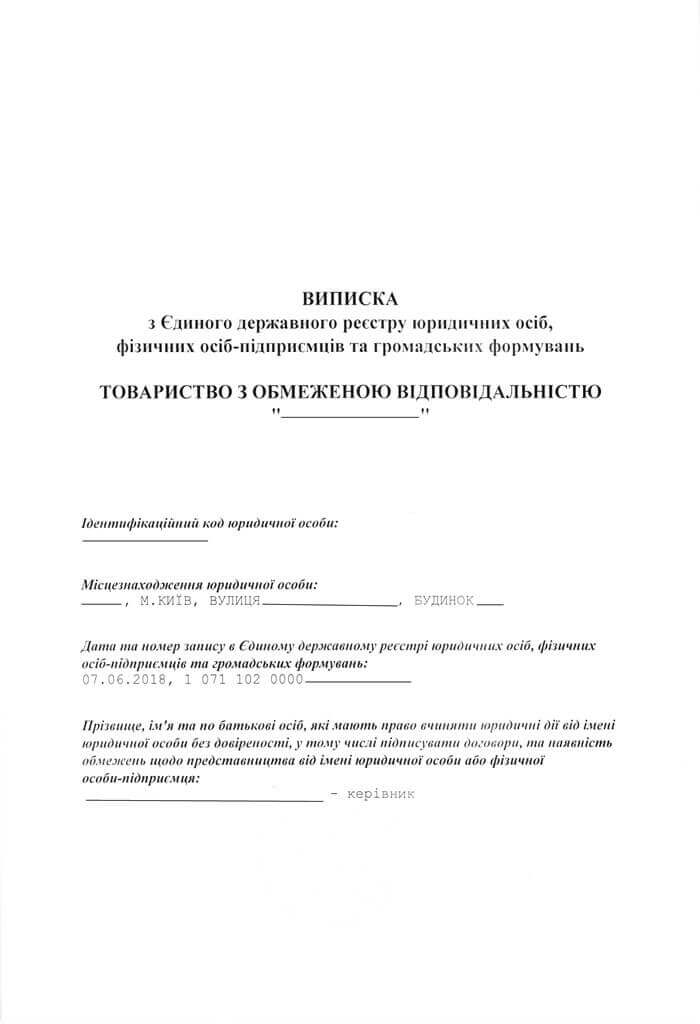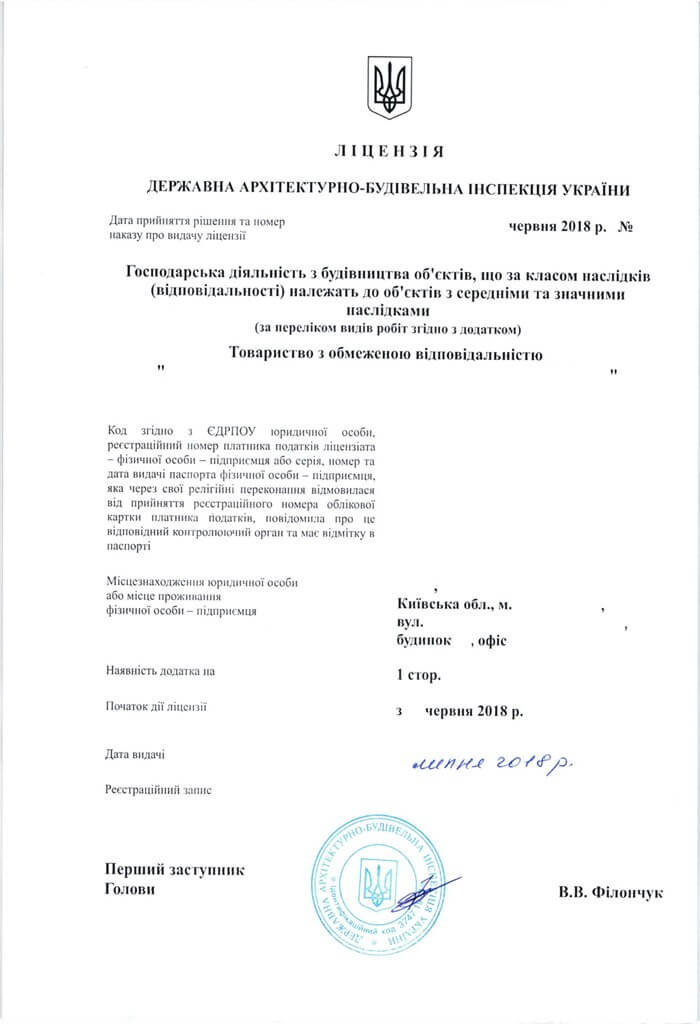How Can Foreign Companies Obtain Construction Permits in Ukraine?
Cost of services:
Reviews of our Clients
Quick response forse "Tiger" LLC expresses gratitude to Law firm «Pravova dopomoga» for long-term cooperation, which brings only positive results.
Despite the challenges posed by martial law, Ukraine is actively rebuilding its infrastructure and creating opportunities to attract foreign construction businesses. One such opportunity is the simplified procedure for obtaining construction permits for non-resident companies. This streamlined process significantly facilitates market entry for international construction firms, encouraging them to participate in Ukraine's recovery and development.
How can foreign companies leverage this new procedure? What steps must a non-resident company take to quickly enter the construction services market in Ukraine? These are the questions we address in this article. We will discuss how foreign companies can obtain a construction permit, the types of projects they apply to, and the key advantages of the simplified procedure that Ukraine now offers to international developers.
You might also like: Construction During Wartime: How to Work Under a Declaration?
What Has Changed in Legislation?
Recent amendments to the Cabinet of Ministers of Ukraine Resolution No. 314 dated March 18, 2022, have introduced simplified conditions for foreign companies operating through permanent establishments in Ukraine to engage in construction activities. Previously, non-resident companies were required to obtain a full construction license to work on projects classified as medium (CC2) and significant (CC3) consequence classes, a process that involved considerable time and effort.
With the new regulations implemented during martial law, this process has been significantly simplified. Non-residents can now gain the right to conduct construction activities by submitting a declaration to the licensing authority. This declaration is free of charge and includes the information specified in the resolution. As a result, non-resident contractors intending to work on CC2 and CC3 class projects are no longer required to obtain a full construction license.
Projects Covered by the Simplified Procedure
During martial law, non-resident contractors can construct buildings classified as CC2 and CC3 without obtaining a license, requiring only the submission of a declaration. This change simplifies administrative barriers and creates new opportunities for foreign companies. But what do these building consequence classes mean, and why are they significant for contractors?
Building consequence classes (CC) determine the level of risk associated with potential damage or destruction of a structure and the impact such incidents might have on human life and health. These classifications are a critical indicator of the severity of potential consequences if something goes wrong. The consequence class directly influences the complexity of the project, the required safety standards, and the approval process for project documentation.
- CC2 – Medium-Level Consequence Objects
This class includes structures in the 3rd and 4th categories of complexity, such as multi-apartment residential complexes or administrative buildings. Designing these objects requires strict adherence to building regulations and thorough documentation review. While CC2 structures are not as critical as those in the CC3 category, they still demand careful attention to detail and compliance with all construction standards.
- CC3 – High-Level Consequence Objects
This class encompasses structures in the 5th category of complexity, such as industrial facilities, medical institutions, or other critical infrastructure. Any failure or violation in these buildings could result in serious consequences for human life or the environment. CC3 projects require the highest levels of safety measures, reliability, and construction quality, reflecting their critical importance to public welfare and safety.
According to DBN V.1.2-14-2009, the consequence class of a building is determined during the design phase. This classification is mandatory for the approval of project documentation by state or private expert bodies.
Steps for Obtaining a Construction Permit for a Foreign Company
To submit a declaration, a foreign construction company must provide the following documents and information:
1. Information about the non-resident entity:
- Country of origin and legal organizational form.
- Full and abbreviated name (if applicable).
- Identification code in the Unified State Register of Enterprises and Organizations of Ukraine (EDRPOU).
- Address, contact phone number, and email.
- Details of the head or authorized representative.
2. Information about the permanent establishment:
- EDRPOU code.
- Tax registration details (registration date and tax authority code).
3. Actual address of operations in Ukraine.
4. Type of foreign economic activity conducted.
5. Name of the permitting document being sought.
6. Commitment to comply with Ukrainian legislation.
The declaration can be submitted via the user’s electronic cabinet on the Diia portal (using the “Declaration” service) or in paper form at Administrative Service Centers (CNAP). Submission is free and takes only a few minutes. Once the declaration is accepted, the foreign company is granted the right to conduct construction activities in Ukraine. During martial law, the declaration takes effect immediately upon submission, enabling companies to promptly begin operations.
Please note! The simplified procedure is available only during martial law. After its conclusion, non-resident companies must obtain a construction license through the standard procedure. A three-month period is provided to fulfill this requirement, so companies should prepare in advance.
You might also like: Accounting Support for Construction and Installation Works by Foreign Companies in Ukraine
Advantages of the New Construction Permit Procedure for Non-Resident Contractors
The simplified process for obtaining construction permits provides several significant benefits for foreign contractors working in Ukraine under martial law. Here are the key advantages:
- Time and Cost Efficiency: The process of obtaining a construction license is often lengthy, involving extensive checks and bureaucratic formalities. With the new procedure, foreign companies can submit a declaration and receive authorization for construction activities within minutes.
- Ease of Submission Through Digital Platforms: The declaration can be submitted via the Diia portal, streamlining the entire process and making it accessible to all contractors. The elimination of the need for in-person visits to government offices reduces administrative expenses and saves valuable time—an essential factor in the current context.
- Increased Transparency and Equal Opportunities: The standardized procedure ensures that all contractors operate under the same conditions when submitting declarations for construction work. This guarantees transparency in the process and provides foreign companies with confidence that they will receive permits on equal terms with other market participants.
- Rapid Authorization for Operations: The new procedure enables contractors to quickly gain authorization to begin construction projects, which is particularly crucial for restoration projects.
Why Was It Necessary to Simplify the Procedure?
Ukraine is actively rebuilding infrastructure damaged during the war, making this a top national priority. This effort requires significant investments, advanced technologies, and expertise that are not always available within the domestic market. Attracting international partners who are ready to contribute their resources, knowledge, and experience is essential to achieving these goals.
However, bureaucratic barriers and complex administrative procedures have often impeded this process. Simplifying the construction permit procedure became a necessary step to make the Ukrainian market more accessible to non-residents. This change enables foreign companies to launch projects more efficiently, thereby accelerating reconstruction and modernization efforts.
Our team has been a reliable partner for foreign companies operating in Ukraine for years. We provide a full range of legal services to support foreign businesses in the construction industry. Our lawyers can assist with the following:
- Preparation and Submission of Declarations: Providing consultations on correctly completing declarations in compliance with legal requirements, reviewing and preparing all necessary documentation, and assisting with submission via the Diia portal or Administrative Service Centers (CNAP).
- Legal Support for Permanent Establishments: Registering a permanent establishment in Ukraine, providing consultations on tax accounting and reporting requirements.
- Consultations on Project Consequence Classifications (CC2, CC3): Assisting in determining the consequence class of a project under DBN V.1.2-14-2009.
Our years of experience working with foreign companies in the Ukrainian market enable us to provide effective support at every stage. We will help you navigate bureaucratic hurdles and tailor your operations to align with the specifics of Ukrainian legislation.
Contact us—our expertise allows you to concentrate on expanding your business in Ukraine while we take care of all legal matters.
Our clients















